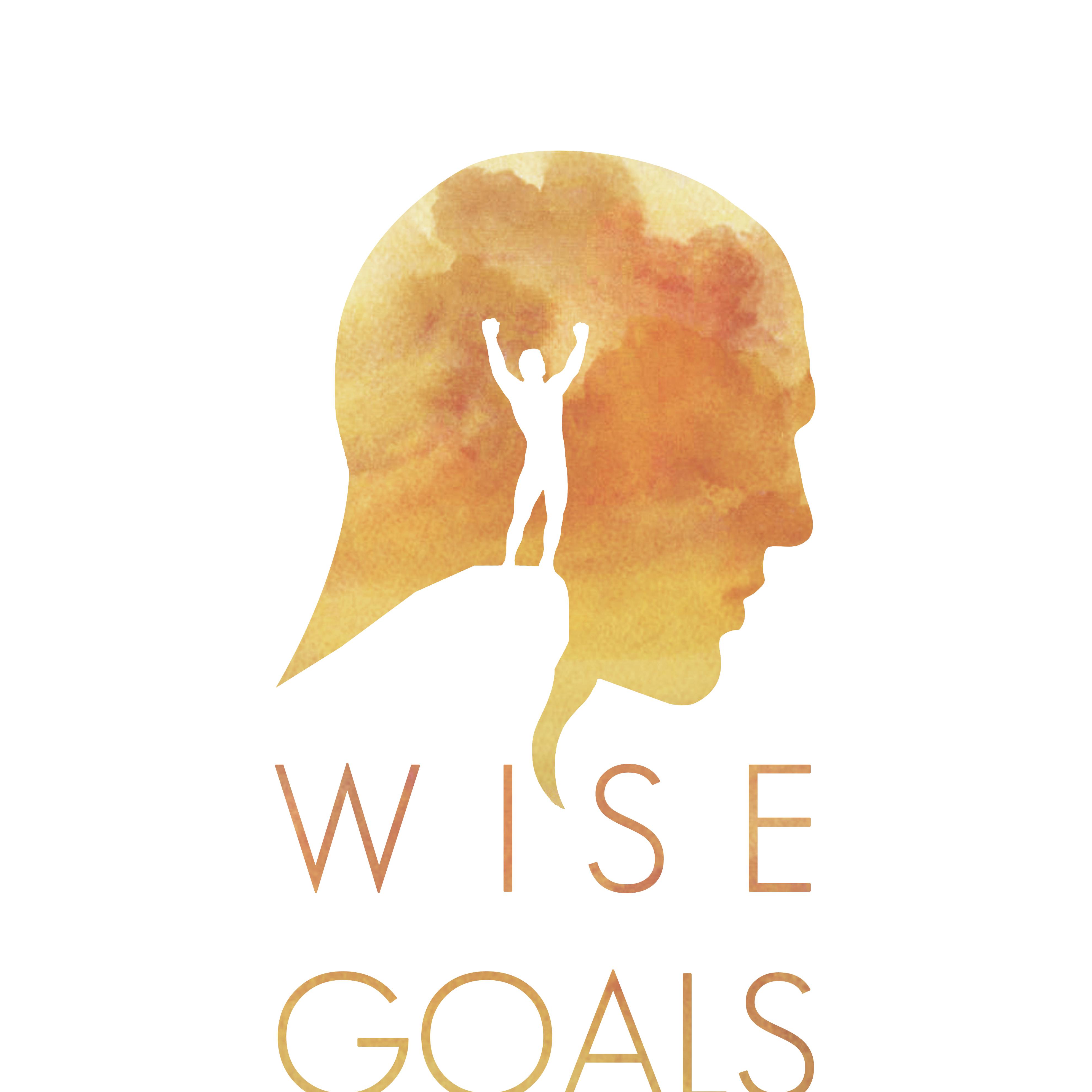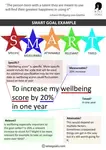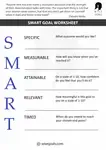- Home
- All about Goal Setting
- Changing Habits with Goals
changing bad habits, and Creating Good Ones
Some powerful science and tips for creating and establishing changes in yourself
Are you looking to change some bad habits? Perhaps some ideas for ways forward, or some inspiration to get you going?
As a qualified and accredited coach it's my job to enable you to do just this. The good news is, even though habits can be stubborn, it's still very much possible!
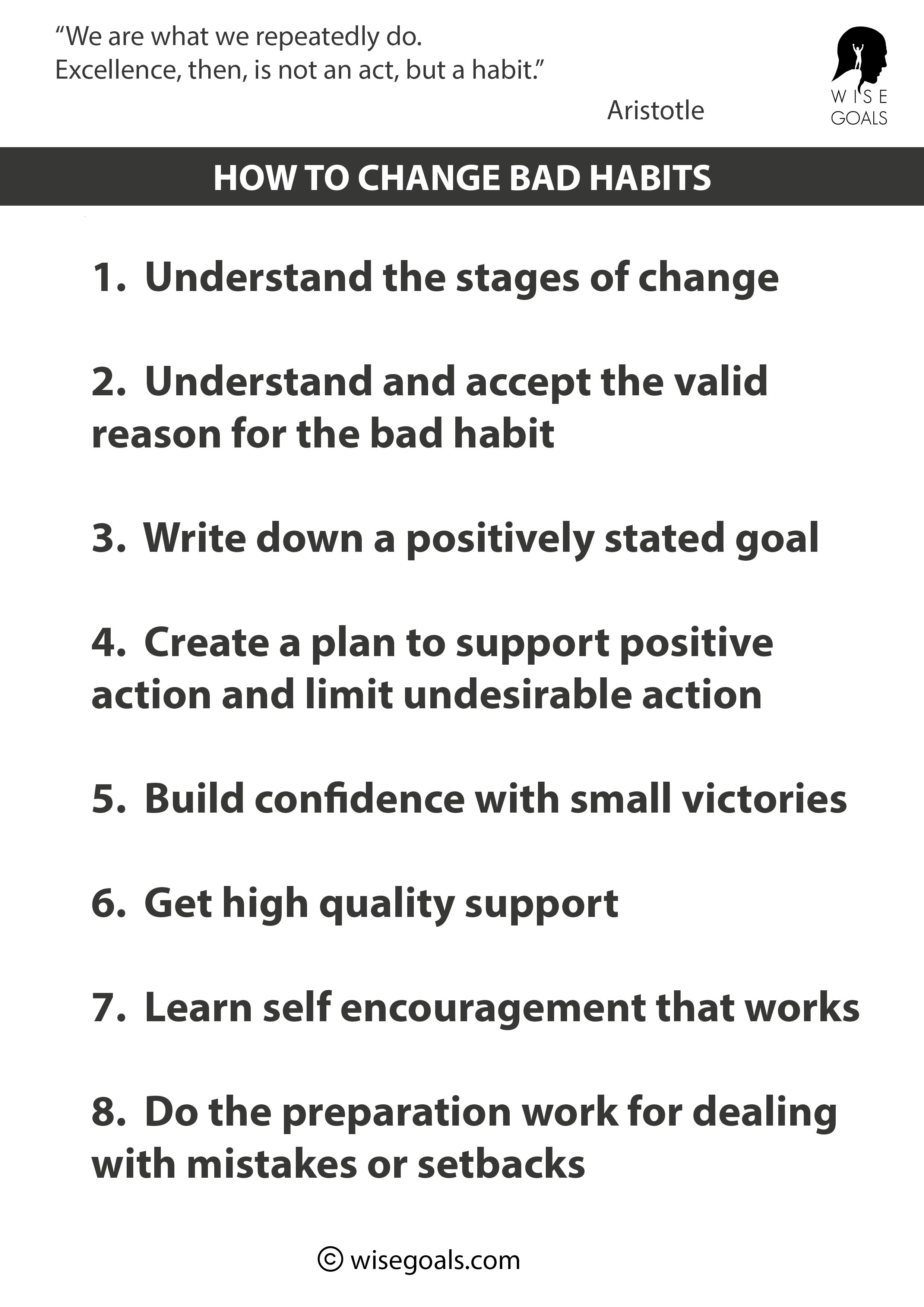
What bad habit are you trying to change or replace with a good habit?
Here are some of the most popular areas of desired change. What's most interesting to you?
- Eat healthier and more nutritional meals
- Eat less Chocolate/quit chocolate (or junk food etc)
- Drink less/stop drinking/drugs/smoking
- Less TV shows/movies/gaming
- Develop autonomy - i.e. being able to say no, being assertive
- Start exercising/training more often
- Stopping self criticism, self doubting, self blaming, self hatred
- Stopping criticism of others and pushing them away (internal or external)
- Late nights and not enough sleep
- Get better with money and save/pay off debt
- Stopping some behavioural habit in your relationship
- Stopping insincerity/faking it and start being authentic/vulnerable
Why is it important to change bad habits?
Bad habits, and the world of factors behind them, are often one major obstacle between you and your goals. You may know what you want to achieve, but struggle with procrastination, or seem to not have enough time.
Procrastination is an avoidant urge. It's the urge to avoid doing something you think is important to you, and instead do something else. You put off, delay, hesitate... It is a word often used unhelpfully to blame or criticise the self. When even one little bad habit changes, procrastination is less of an issue in that area. In the same way, we all have 24 hours a day and when your bad habits stops it frees up a lot of time!
Making lasting changes in your behaviour, beliefs, thoughts and words is the golden road to achievement and fulfilment.
Why is it difficult to change bad habits?
This is an important question and one that can empower you to find the hope that actions for change are worth trying again.
There are multiple significant and helpful psychological perspectives on change. I'm an accredited coach. I did a Masters degree in coaching psychology and positive psychology.
I'll discuss two helpful theories here. Learned Helplessness and Stages of change.
Learned Helplessness
In a historical psychological study in 1967 that always makes me feel a little sad, a researcher tests 3 groups of dogs. With one group the dogs receive random mild shocks but can turn it off with a lever, which they learn to do. In another group the dogs also receive random shocks but the lever does nothing. The 3rd group is a control group.
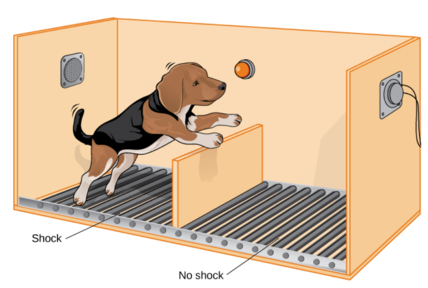
The dogs that learnt that nothing they do changes the shock, when later placed in a chamber where one side has shocks and the other doesn't, don't jump over to the non-shock area, whereas the other groups of dogs do. Heart-breaking implications.
The experimenters try showing them (demonstration), and offering rewards, but the dogs simply endure the shocks and whimper through it. Only when they actually move the dog, picking them up and moving their legs, a couple of times, do the dogs start to do it by themselves.
If you can relate to the idea of learned helplessness when it comes to you trying to creating changes then it may be important for you. It's normal for helplessness to vary in different areas of your life. For example, you may feel powerful and able to create changes in work, but feel helpless when it comes to dating.
You may have learned over time that whatever you do in dating (add any subject here) nothing seems to work but in work you try things and have had many successes and get lots of recognition and respect. Realising the potential impact of learned helplessness in actual situations can empower you to unlearn it, and learn something else.
Stages of change
The stage of changes model by Prochaska and DiClemente is as follows:
- pre-contemplation - not knowing there is a problem to be changed
- contemplation - change in awareness, conflicted thoughts and feelings
- Preparation - collecting useful information and resources and planning the how and when
- Action - trying something. Doing something different
- Maintenance - trying to maintain the new behaviour and avoiding the old behaviour. Managing setbacks.
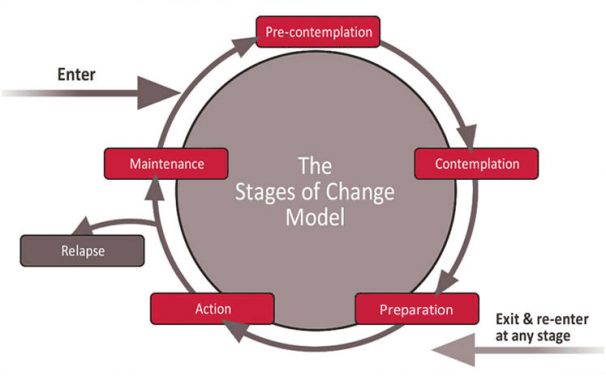
Replase is often added as an extra stage between action and maintenance because of it's inevitability in the process of creating change. (Prochaska and Velicer, 1997)
So how can this be helpful?
Well, first of all, in the work of changing bad habits, reflecting on where you are now can help you choose an intervention or approach that is better suited to the stage you are currently at. If you think you are in the preparation stage, what you need to do to support yourself is clearer. You're empowered to make more effective choices perfect for now.
Also, a model like this can help you realise if you may have missed or not given sufficient attention to an important stage. Seeing the whole process from beginning to end, can also empower you, knowing that even if you are in contemplation, this is a significant and important part of changing.
Also, seeing a larger picture of change can be used to support yourself with self-encouragement.
- rather than "I don't know what to do" - "I'm in the preparation stage, gathering information".
- and instead of "I've messed up" - "relapsing is part of the process of change. I'm in the maintenance and relapse stage of change. Almost there"
Many of the typical inner obstacles to creating change, such as shame, impatience, fear, confusion, despair, can be managed better by zooming out and looking at the whole process more broadly.
Accepting the valid reason for doing the bad habit
The hold of a undesirable habit can be softened and lessened with acceptance. This is acceptance for the purpose of moving forward. Sounds like a paradox... but it can be powerful to acknowledge that while you certainly want to change, there is also a good and valid reason for you starting the so called "bad" habit, and continuing the habit. i.e. there is a benefit to you.
This is important work in the contemplation stage and can often free up movement to the next stage.
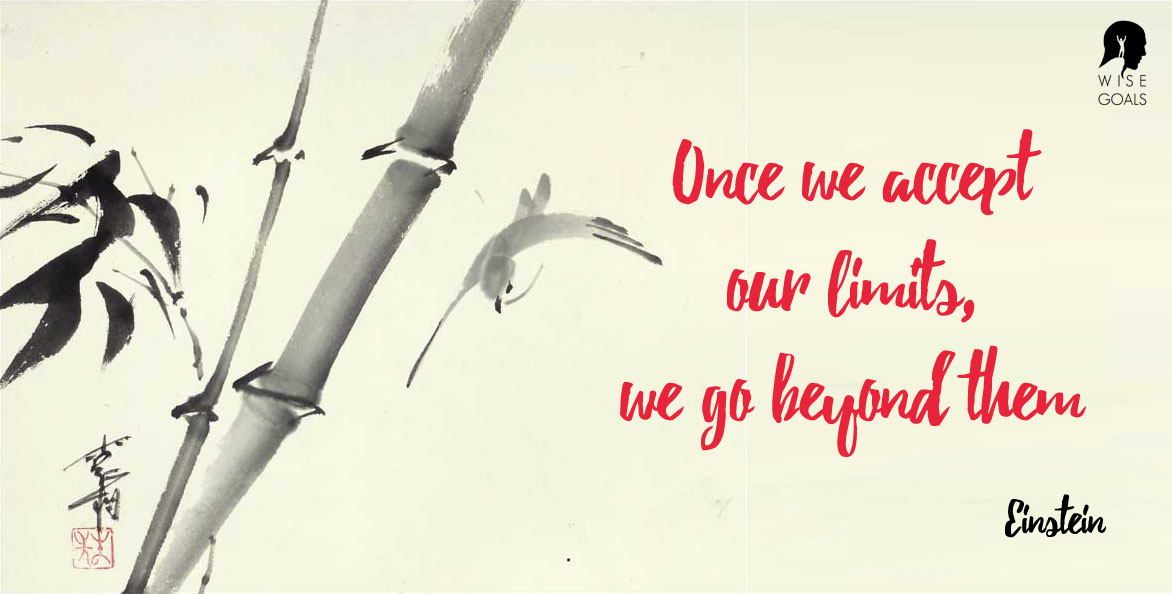
Shame, or "I'm bad/useless" is not a freeing and expansive experience. The truth is, you are not flawed or a failure or anything of the sort. You simply supported yourself to the best of your ability with the skills and resources you had at the time. Now, with new options, new levels of personal development, you are ready for change. And with self-kindness, self-respect, and new insights and learning you are ready to find and establish new ways of meeting your needs.
Writing a positively stated goal
Often clients know what they don't want to be doing which is a great start. Perhaps you want to stop eating junk food, drinking alcohol, binging tv shows, staying up past midnight, being cruel to yourself, being easily led. Knowing the valid thing you get from doing it and beginning to fulfil that need elsewhere, you can also now choose a new direction.
An exciting, positive direction, that you believe is possible, and feels and sounds good to you, is motivational... and changing your bad habits is far easier with a healthy dose of positive motivation and drive. Without this, there is a kind of void at some point and this probably means many more avoidable relapses.
Take being easily led, or not being able to say no, for example - the benefit you get might be avoiding conflict. You go with the flow, and ignore what you want, because if you don't the conflict may be even more difficult for you. So in a way you're supporting yourself based on where you are right now. You're choosing medium pain over larger pain.
If you could experience conflict more positively, which doesn't happen overnight, then the scales would be tipped, and you'd do that instead.
So the positively stated goal, might be, to experience saying no positively. To feel good about saying no. To enjoy saying what you want from the person or in the situation. Then you have a starting point or positive focus, so planning and adding details can begin.
Ideally your goal will be SMART, so you can ask yourself SMART questions...
- When will I do this by? (timed)
- How will I know for sure when I've done it? (specific and measurable)
- How manageable do this feel for me? (attainable)
- How important is this? (relevant)
Create a plan and strategy to support positive action and limit undesirable action
Once you have a positive thing to aim for it's time to get real. To consider the details. Your life in reality is a complex landscape with varied important factors. Honouring the whole reality in relation to your habit, as best you can, is supportive. You can use these questions, or the worksheet below to make a start.
- What comes first? Then what?
- What's gonna get in the way?
- What can you do that will make it easier?
- How can you prepare for temptation?
- What will you do during a set back?
- How many set backs will you allow, honouring the path to change?
- How will you help yourself to feel good when you take new action?
As a coach, I look to raise my clients momentary self-awareness as it's empowering. Then in that highly self-aware moment I shift focus to actions, planning, creative solutions, etc...
If you're looking to adopt a strategic approach to changing bad habits that encompasses multiple domains (i.e. self, environment, society), you can use the following list of options to create a strategy to help you make and maintain change.
- Grow new habit awareness - Find out more about the area you are interested in - can you watch a documentary, read a book, join a group, gather some articles.
- Positive or negative emotional experience in support of your new habit change.
- Re-evaluation of who you want to be - integration of the new habit as a part of you.
- Grow awareness of impact on society - Reflecting on how your bad habit and new good habit impacts the people around you, the environment, and the world.
- Seek societal approval - find and connect with supportive elements of society in relation to your new positive habit.
- Growing personal commitment to free yourself from the past.
- Positive Relationships - Finding supportive people that cause you to feel good about the change you want to see.
- New thought and action planning - What will you replace the old habit with. What thinking, beliefs, actions, come with that.
- Maintenance support - Managing the rewards of old and new habits. More positive rewards for new behavior.
- Adjusting your environment - this is about making your environment a support rather than a hindrance to your new habit. Removing temptation and making it easier to do the thing you want to do.
Build confidence with small victories
I use the word confidence here as it's the popular term but really I'm talking about self-efficacy, or task specific confidence. The movement from action to maintenance with it's lapses and relapses in the middle from the stages of change model above, is supported by self-efficacy. Action, disappointment, action, maintenance, new disappointment, new action, more maintenance... this process of change is ideally also one of growing self-efficacy.
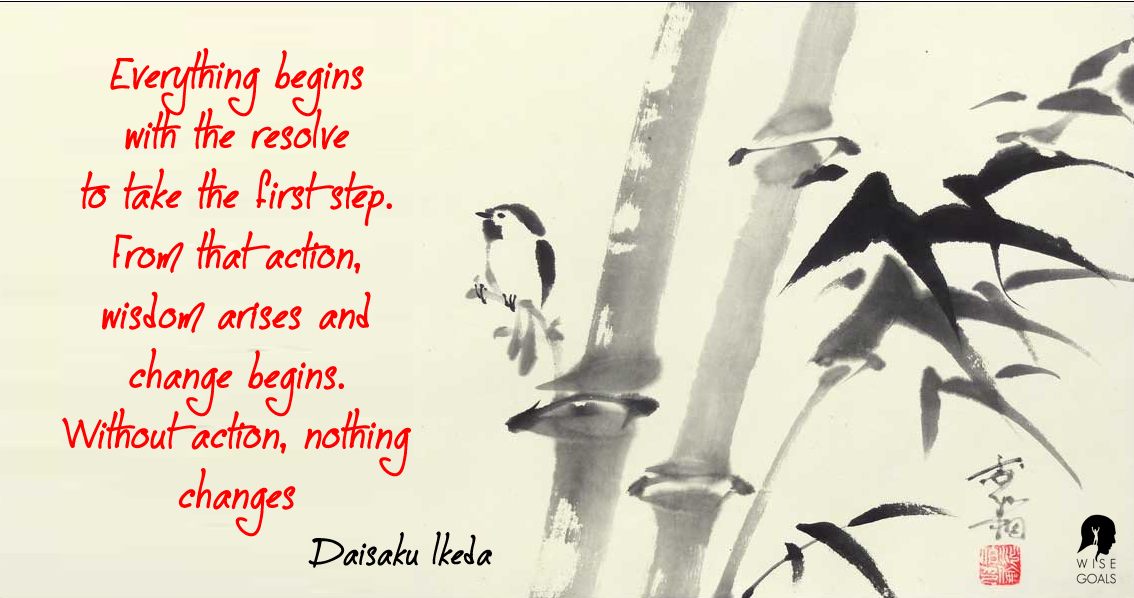
There is more self-efficacy, or belief you can do a thing, when there are past experiences of it going well. So it's important to search for your past relevant experiences. You may be surprised what you'll find...
Then, it's creating those experiences of success by starting small while being firm with your inner critic if it says stuff like "Is that all you can do?", "You'll never get anywhere at this pace".
When you defeat your inner critic, and when your body and emotions actually feel signs of victory... hope and capability will grow and you'll be able to do more and more. Just like a flower needs sunshine and rain to grow, you need various kinds of support.
Get high quality support
Your environment, including the people in it, are of course, vital when it comes to you changing your bad habits. For example, if you're trying to cut down drinking and are surrounded by people who are praising and celebrating alcohol use and criticising "boring people" who don't drink, this isn't likely to make change more manageable.
Perhaps your family or friends who are so used to the old behaviour don't take your eating difficulties seriously and continue to bring you chocolate over and over again even when you've explained the change you're trying to make. All of this matters.
Finding the opposite of these is important. A counsellor, a coach, support groups, new activities with different groups of people. Getting in touch with well-chosen friends or past acquaintances.
When it comes to those who are unsupportive, here are a few possibilities:
- Spending less time with them
- Stopping contact for a short period of time
- Stopping contact until you've developed new ways of managing their influence
- Stopping contact until you've completed your change
I'm sure you can think of many more. However you manage to do it, you want people who support you, who celebrate you're victories, who understand the challenges, who agree with the importance of the change. You also want to connect with people who are doing what you want to do well... who have made significant progress so you feel inspired hearing from them.
Learn self-encouragement that works
Encouragement is the process of causing courage to rise up which will be needed many times. So causing courage to rise up in you, alongside the very real, very serious, difficulties and obstacles, is a major part of this work of changing bad habits.
How are you when it comes to praising yourself? Telling yourself that you're capable and that you can do it? Looking for evidence to support that? How do you respond to your inner doubter who says your kidding yourself, it's pointless? Or when fear and thinking about all the things that could go wrong takes over? What if this happens, what if that happens?
How about rumination? or self-flagellation?
There is so much in our inner worlds that can hold us back. In the field of psychology these are known as cognitive distortions or performance inhibiting thoughts. Overcoming these inner obstacles and learning to encourage yourself, changing, baby step after baby step how you think, may be a significant step, especially if you notice that you often think yourself into inaction, procrastination, and stickiness.
Do the preparation work for inevitable setbacks and mistakes
You can see from the stages of change model that setbacks are part of the change process. Change without setbacks or lapses, is a fantasy... it simply doesn't happen. Wanting that to happen, wanting perfection, wanting it to be easy, is a limiting factor to be overcome within itself.
Growth mindset (Dweck, 2017), a subject in positive psychology offers some fascinating insights.
In a nutshell, it's about the influence of underlying beliefs about difficulty. When you believe difficulty = growth you experience many benefits. Greater accomplishment, wellbeing, enjoyment of life, and of course more progress and learning.
In contrast, when difficulty and failure stirred beliefs of being not good, stagnation occurs.
Of course everyone has both mindsets to different degrees and in different areas. The good news is it can be developed like a muscle. This can be done by praising things that are within your power. So when something goes well in your attempts to change something, you can praise your strategy, your consistency, your effort, or your wise approach of getting support.
By praising something that can be repeated and increased you are sending messages to your brain that it depends on you and you can do it...
Then during those inevitable setbacks, you'll remember more and more, "it depends on me and I can find a way" or "I could try this next time!".
Recommended Articles
- How your phone can help you set better habits - Harvard Business Review article
References
Dweck, C. S. (2017). Mindset: Changing the way you think to fulfil your potential. New York Constable and Robinson.
Prochaska, J.O. and Velicer, W.F. (1997). The transtheoretical model of health behavior change. Am J Health Promot. 12(1):38-48. doi:10.4278/0890-1171-12.1.38. Available at: Sage Journals
- Home
- All about Goal Setting
- Changing Habits with Goals
Affiliated With
We are proud to be part of professional networks that value evidence-based practice, inclusion, and social impact.



